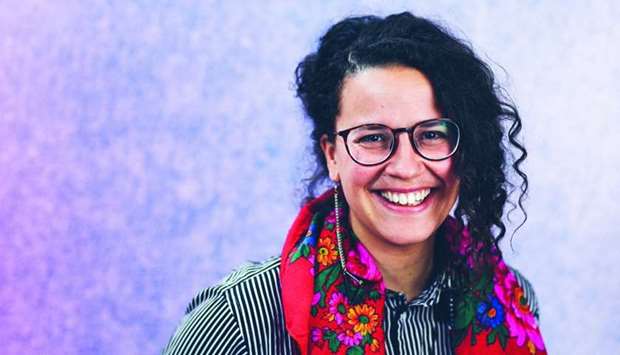International filmmakers attending the sixth Ajyal Film Festival, the annual cinema event presented by the Doha Film Institute, highlighted the power of cinema to connect generations, underlining the theme of Ajyal, ‘A Voice for Generations.’
At a press briefing, Naziha Arebi, the director of Ajyal’s Opening Gala, Freedom Fields (Libya, UK, Netherlands, US, Qatar, Lebanon, Canada/2018), said making the film taught her many things, most importantly that “we have more strength and power [within us] than we realise to continue even when everything is bad.”
Nominated for the Best Documentary Award at the Stockholm Film Festival 2018, Freedom Fields follows three women and their efforts to build a football team in post-revolution Libya. Naziha said that as the film progresses you realise that “it is no longer about playing football but about how the women use sport for reconciliation and trauma relief. Football becomes a vehicle, a metaphor and space to discuss the stories of the women. With no other vehicle would I have been able to access so many powerful women from so many different parts of the society.”
She said the film connects to global audiences because it depicts “the power of community, the power we have as a team [in] supporting each other. When we accept our differences, and collaborate, maybe we can make a better world.”
Naziha says the women protagonists of the film inspire everyone. “These women are all different. They had problems and adversities; yet they worked together and end up giving something to the next generation. To me, that is a beautiful thing and we can all be inspired by that.”
She said the starting point of the film’s idea was rather simple. “But when I spent more time, writing and rewriting, I realised there is something more beautiful, rich and complex [to the story]. It is not just about women playing football in some exotic place; that narrative has been done before. I wanted to do something different, and do something to honour the spirit of these women. They are strong, beautiful, and the way they work together, despite all differences, is very powerful.”
Naziha did not go by a bound-script for the film. “I like to write what I would like to happen and also what is actually happening. And then when I go into the field, I throw everything out of the window and go by my gut. It is important to be adaptable, to change and bend because if you try and force something, it doesn’t work. And also, reality is far more interesting than what you imagine in your head. But I also had a vision of what I wanted.”
She said the title of the film was there from the beginning. “I don’t know how, it just came. It represents the space where they [the protagonists] can be themselves. It is also a metaphor about creating spaces where we can be ourselves.”
On her film cited as being on ‘women empowerment,’ Naziha said she personally dislikes the word ‘empowerment’ because “it implies the others don’t have power in the first place. All have power, nobody gives you that. I did not give anyone strength [while making the film]; nobody gave them [the protagonists] any strength. They had it in them. And I believe that sport is a great tool to discover it [one’s inner strength].”
The screening of Freedom Fields at Ajyal also complemented the vision of the Supreme Committee for Qatar 2022 to deliver the first-ever FIFA World Cup in the Middle East, and coincided with the symbolic handover year of the World Cup from Russia to Qatar.
Also at Ajyal were Engin Altan Duzyatan, the star of the smashing Turkish series Ertu?rul; Yusuf Esenkal, the producer of the superhit Turkish series Sultan Abdul Hamid; Bulent Inal, the main actor of the same series, and Turkish actor Cavit Cetin Guner.

Naziha Arebi during the 'Freedom Fields' press briefing at Ajyal.
